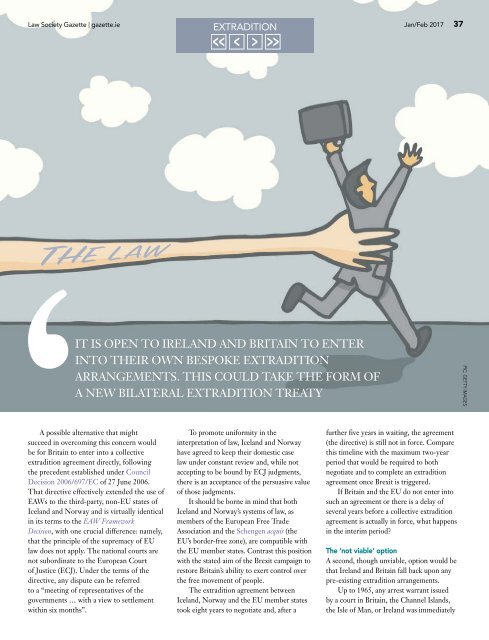ga ette
Jan-Feb-17-Gazette
Jan-Feb-17-Gazette
You also want an ePaper? Increase the reach of your titles
YUMPU automatically turns print PDFs into web optimized ePapers that Google loves.
Law Society Gaz<strong>ette</strong> | <strong>ga</strong>z<strong>ette</strong>.ie<br />
EXTRADITION<br />
Jan/Feb 2017 37<br />
THE LAW<br />
IT IS OPEN TO IRELAND AND BRITAIN TO ENTER<br />
INTO THEIR OWN BESPOKE EXTRADITION<br />
ARRANGEMENTS. THIS COULD TAKE THE FORM OF<br />
A NEW BILATERAL EXTRADITION TREATY<br />
PIC: GETTY IMAGES<br />
A possible alternative that might<br />
succeed in overcoming this concern would<br />
be for Britain to enter into a collective<br />
extradition agreement directly, following<br />
the precedent established under Council<br />
Decision 2006/697/EC of 27 June 2006.<br />
That directive effectively extended the use of<br />
EAWs to the third-party, non-EU states of<br />
Iceland and Norway and is virtually identical<br />
in its terms to the EAW Framework<br />
Decision, with one crucial difference: namely,<br />
that the principle of the supremacy of EU<br />
law does not apply. The national courts are<br />
not subordinate to the European Court<br />
of Justice (ECJ). Under the terms of the<br />
directive, any dispute can be referred<br />
to a “meeting of representatives of the<br />
governments … with a view to settlement<br />
within six months”.<br />
To promote uniformity in the<br />
interpretation of law, Iceland and Norway<br />
have agreed to keep their domestic case<br />
law under constant review and, while not<br />
accepting to be bound by ECJ judgments,<br />
there is an acceptance of the persuasive value<br />
of those judgments.<br />
It should be borne in mind that both<br />
Iceland and Norway’s systems of law, as<br />
members of the European Free Trade<br />
Association and the Schengen acquis (the<br />
EU’s border-free zone), are compatible with<br />
the EU member states. Contrast this position<br />
with the stated aim of the Brexit campaign to<br />
restore Britain’s ability to exert control over<br />
the free movement of people.<br />
The extradition agreement between<br />
Iceland, Norway and the EU member states<br />
took eight years to negotiate and, after a<br />
further five years in waiting, the agreement<br />
(the directive) is still not in force. Compare<br />
this timeline with the maximum two-year<br />
period that would be required to both<br />
negotiate and to complete an extradition<br />
agreement once Brexit is triggered.<br />
If Britain and the EU do not enter into<br />
such an agreement or there is a delay of<br />
several years before a collective extradition<br />
agreement is actually in force, what happens<br />
in the interim period?<br />
The ‘not viable’ option<br />
A second, though unviable, option would be<br />
that Ireland and Britain fall back upon any<br />
pre-existing extradition arrangements.<br />
Up to 1965, any arrest warrant issued<br />
by a court in Britain, the Channel Islands,<br />
the Isle of Man, or Ireland was immediately



